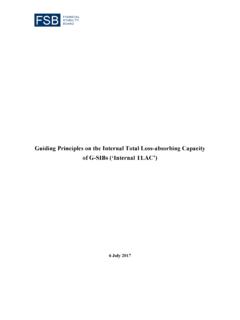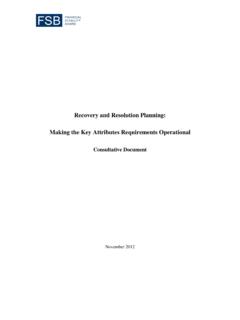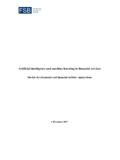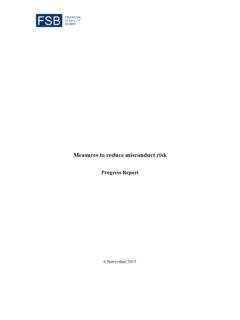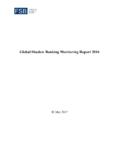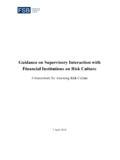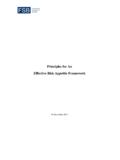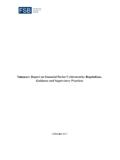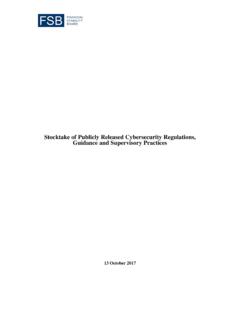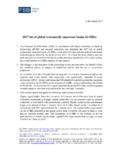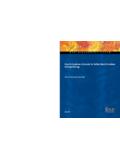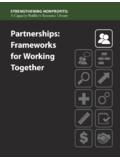Transcription of Strengthening Governance Frameworks to Mitigate …
1 Strengthening Governance Frameworks to Mitigate Misconduct Risk: A Toolkit for Firms and Supervisors 20 April 2018 The Financial Stability Board (FSB) is established to coordinate at the international level the work of national financial authorities and international standard-setting bodies in order to develop and promote the implementation of effective regulatory, supervisory and other financial sector policies. Its mandate is set out in the FSB Charter, which governs the policymaking and related activities of the FSB. These activities, including any decisions reached in their context, shall not be binding or give rise to any legal rights or obligations under the FSB s Articles of Association. Financial Stability Board Sign up for e-mail alerts: Follow the FSB on Twitter: @FinStbBoard E-mail the FSB: Copyright 2018 Financial Stability Board. Please refer to: iii Contents Preface.
2 V Executive summary .. 1 Phases of the workplan .. 1 The toolkit .. 4 1. Mitigating cultural drivers of misconduct: Tools 1 7 .. 8 2. Strengthening individual responsibility and accountability: Tools 8 12 .. 22 3. Addressing the rolling bad apples phenomenon: Tools 13 19 .. 32 Annex A: The process of normalising misconduct .. 45 Annex B: Supervisory approaches and practices to supervising culture .. 47 Annex C: Summary of existing principles and guidance aimed at Strengthening individual responsibility and accountability .. 50 Annex D: Summary of survey of national authorities approaches to Strengthening individual accountability .. 53 Annex E: National authorities approaches to addressing bad apples .. 60 Annex F: Information sharing concerns in other sectors .. 68 Annex G: Industry information-sharing regimes .. 70 iv v Preface Widespread misconduct in the financial sector on a broad scale creates mistrust, weakening the ability of markets to allocate capital to the real economy.
3 This in turn may give rise to systemic risks, which is why addressing misconduct is part of the Financial Stability Board s (FSB) work programme. Recent instances of misconduct have included collusion in the manipulation of wholesale markets and retail mis-selling schemes. Financial penalties are often extensive. Since the financial crisis of 2007 08, fines and legal costs for misconduct by global banks are estimated to have reached more than $320 However, as noted by Mark Carney, Chair of the FSB, in his July 2017 letter to G20 Leaders, Fines are essential to punish wrong doing and have an important deterrent effect, but it is insufficient and inefficient to rely solely on ex post penalties of institutions and their shareholders. The resources paid in fines, had they been retained as capital, could have supported up to $5 trillion in lending to households and Fines and sanctions act as deterrents to misconduct. Such fines have generally been imposed on firms rather than individuals, but preventative approaches that aim to influence the behaviour of individuals may also be needed to Mitigate misconduct risk.
4 Among these preventive approaches are improved corporate Governance practices. In May 2016 the FSB established a Working Group on Governance Frameworks (WGGF), chaired by Jeremy Rudin, Superintendent of Financial Institutions (Canada), to explore the use of firms Governance Frameworks to Mitigate misconduct risk with a view to potentially developing a toolkit for firms and supervisors, taking into account the work of the standard-setting bodies (SSBs). It is for firms and authorities to determine how best to address conduct issues in their jurisdictions. Therefore, rather than creating an international standard or adopting a prescriptive approach, the FSB is offering this toolkit as a set of options based on the shared experience and diversity of perspective of FSB members in dealing with misconduct issues. Mitigating misconduct risk requires a multifaceted approach. This toolkit forms one of the building blocks of the FSB s 2015 Workplan on Measures to Reduce Misconduct Risk, which includes:3 Standards and codes of behaviour, such as the FX Global code,4 and reforms to benchmark-setting practices; 1 Boston Consulting Group, Staying the course in banking, Global Risk 2017.
5 The wider costs to the financial system and the economy from misconduct at financial institutions are harder to estimate. 2 FSB, FSB Chair s letter to G20 Leaders building a safer, simpler and fairer financial system, July 2017, p 4. 3 FSB, Measures to reduce misconduct risk: progress report, November 2015. 4 Bank for International Settlements (BIS), FX Global Code, December 2017. vi Toolkit of measures related to wholesale market conduct, based on national approaches;5 Guidance on compensation practices in addressing misconduct;6 and Toolkit for firms and supervisors to strengthen Governance Frameworks by improving corporate culture, clarifying individual responsibility and accountability and preventing the movement of bad apples (employees with a history of misconduct) within or between firms. The most recent update on progress under the overall Workplan on Measures to Reduce Misconduct Risk was delivered to the Hamburg G20 Summit in 2017 and is available on the FSB 5 International Organization of Securities Commissions (IOSCO), IOSCO task force report on wholesale market conduct, June 2017.
6 6 FSB, Supplementary Guidance to the FSB Principles and Standards on Sound Compensation Practices, March 2018. The guidance supplements FSB, Principles for Sound Compensation Practices, April 2009, and FSB, Implementation Standards for the FSB Principles for Sound Compensation Practices, September 2009. 7 FSB, Reducing misconduct risks in the financial sector: progress report to G20 Leaders, June 2017. 1 Executive summary Misconduct8 in some financial institutions has the potential to significantly harm consumers, undermine trust in financial institutions and markets and create systemic risks. As the Federal Reserve Bank of New York recently noted: The impact of employee misconduct extends beyond the individual and can impact the firm as a whole and the economy and financial markets more broadly. Employee misconduct can make a firm less resilient, for example, by diverting management attention, harming a firm s reputation in a way that impedes its business, driving change in the composition of the workforce, and depleting its capital.
7 For the broader economy and financial markets, misconduct can inflict harm directly on consumers and employees. Over time, market participants may lose confidence in the financial sector as a whole and adversely impact its critical role in financial Mitigating misconduct risk is an important issue for both firms and national authorities. While authorities can take steps to promote strong internal practices at firms, these do not replace the actions that firms should take to promote appropriate conduct within their organisations. The FSB, in its workplan on measures to reduce misconduct in the financial sector, agreed to examine, among other things, the role of incentives in reducing misconduct in firms, and whether additional Governance and compensation measures are needed to Mitigate misconduct Compensation practices are a key driver of behaviour and conduct at firms, and the FSB s workplan therefore included a dedicated examination of the use of various compensation tools for addressing Equally, because non-financial incentives play a significant role in driving behaviour, misconduct risk can also be mitigated through internal Governance Frameworks .
8 Governance Frameworks have an ex ante (preventive) focus, which is often made more effective when paired with the deterrent effect of ex post sanctions. Phases of the workplan The FSB s work on the use of Governance Frameworks to Mitigate misconduct risk has taken place in two phases: Phase 1 a stocktake of efforts by international bodies, national authorities, industry associations and firms. Phase 2 development of a toolkit for use by firms and supervisors to strengthen the ability of Governance Frameworks to Mitigate misconduct risk. Phase 1: The stocktake In May 2017, the FSB published the stocktake of efforts to strengthen Governance Frameworks to reduce misconduct risk, which included a two-pronged review covering both the literature on root 8 For the purposes of this toolkit, misconduct can be generally understood as conduct that falls short of expected standards, including legal, professional, internal conduct and ethical standards.
9 9 Federal Reserve Bank of New York, Misconduct risk, culture, and supervision, December 2017, p 3. 10 FSB, November 2015. 11 FSB, March 2018. 2 causes of misconduct in the financial and non-financial sectors and the literature on scientific insights about the effectiveness of various approaches to Mitigate the risks of such In conducting this work, the FSB has understood Governance Frameworks to include the set of laws, regulations, policies, structures and processes used by firms and national authorities to reinforce corporate Governance . Recognising the breadth of understanding and practices across FSB member jurisdictions, the FSB deliberately avoided an exhaustive definition of framework , although provided a common definition for Governance to guide its work: The range of methods and techniques by which a firm is directed and overseen by those who have ultimate responsibility for the affairs of the firm ( directors, executive management).
10 These could include, but are not limited to: corporate Governance structures ( boards13 and board-level committees and management committees); risk Governance framework; individual accountability; strategy setting, business planning and budgeting; internal reporting and management information; system of internal controls (risk management, compliance and audit); financial and non-financial incentives; people management (including recruitment, training and competence, performance management and staff promotions); and promulgation of corporate culture and values ( tone from the top , risk culture, escalation and whistle blowing mechanisms).14 This definition is deliberately broad, covering both structural and behavioural elements of corporate Governance . Out of this stocktake, 10 themes emerged as areas that merit further The FSB explored how each of these themes related to Governance Frameworks , the extent to which reforms related to these topics could lead to mitigation of misconduct risk and whether further international work should be conducted.
